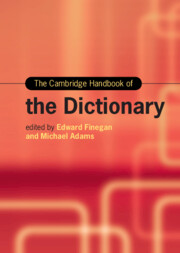Book contents
- The Cambridge Handbook of the Dictionary
- Cambridge Handbooks in Language and Linguistics
- The Cambridge Handbook of the Dictionary
- Copyright page
- Contents
- Figures
- Tables
- Contributors
- Acknowledgments
- Introduction
- Part I Types of Dictionaries
- Part II Dictionaries as Books
- Part III Dictionaries and Ideology
- Part IV Dictionaries and Domains of Use
- Chapter 20 Dictionary Audiences
- Chapter 21 Dictionaries and Intellectual History
- Chapter 22 Dictionaries and Social History
- Chapter 23 Linguistics and Philology in Dictionaries
- Chapter 24 Dictionaries as Literary Artifacts
- Chapter 25 Dictionaries and Editors
- Chapter 26 Lexicography and the Law
- Part V The Business of Dictionaries
- Part VI The Future of Dictionaries
- References: Dictionaries
- References: Secondary Works
- Index
Chapter 26 - Lexicography and the Law
from Part IV - Dictionaries and Domains of Use
Published online by Cambridge University Press: 19 October 2024
- The Cambridge Handbook of the Dictionary
- Cambridge Handbooks in Language and Linguistics
- The Cambridge Handbook of the Dictionary
- Copyright page
- Contents
- Figures
- Tables
- Contributors
- Acknowledgments
- Introduction
- Part I Types of Dictionaries
- Part II Dictionaries as Books
- Part III Dictionaries and Ideology
- Part IV Dictionaries and Domains of Use
- Chapter 20 Dictionary Audiences
- Chapter 21 Dictionaries and Intellectual History
- Chapter 22 Dictionaries and Social History
- Chapter 23 Linguistics and Philology in Dictionaries
- Chapter 24 Dictionaries as Literary Artifacts
- Chapter 25 Dictionaries and Editors
- Chapter 26 Lexicography and the Law
- Part V The Business of Dictionaries
- Part VI The Future of Dictionaries
- References: Dictionaries
- References: Secondary Works
- Index
Summary
Law and lexicography intersect in various ways, involving intricacies in legal phraseology and semantics, the creation of dictionaries both legal and general, the evolving philosophies of what dictionaries should do, how lawyers and judges use dictionaries in their work, and even the settled doctrine that the drafters of legal instruments can be their own lexicographers. The two disciplines are perhaps as closely intertwined as any disparate disciplines can be – all the more so given the dramatic rise of textualism, especially in the United States, since the mid−1980s. Although Judge Learned Hand once cautioned that it is a mistake for advocates and judges to make a fortress out of the dictionary, that view has receded in recent years. If not a fortress, the dictionary is certainly a mainstay in modern judicial decision-making. The chapter treats the history of legal lexicography in Anglo-American law, the methods of modern legal lexicography, how courts use dictionaries, and how legal drafters engage in nonce-lexicography when preparing legal instruments.
- Type
- Chapter
- Information
- The Cambridge Handbook of the Dictionary , pp. 512 - 532Publisher: Cambridge University PressPrint publication year: 2024

